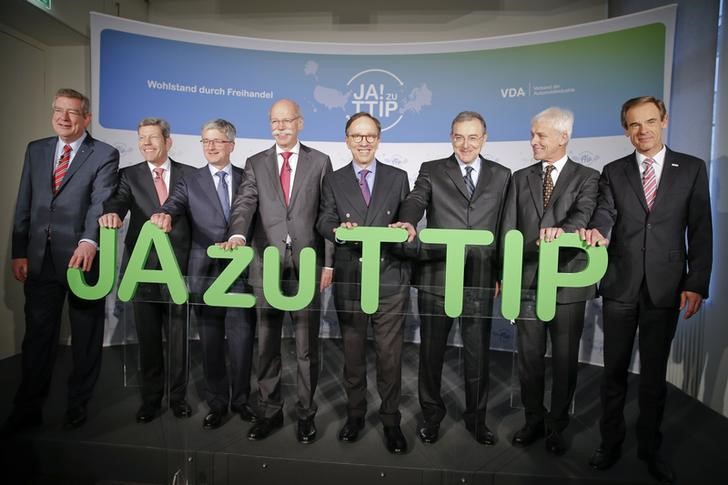By Edward Taylor
BERLIN (Reuters) - The heads of German car companies including BMW (DE:BMWG), Daimler (DE:DAIGn) and Audi lobbied politicians on Wednesday to reach a trade deal that could see tariffs dropped between the United States and the European Union.
BMW boss Norbert Reithofer said around 40 percent of all cars produced are sold in Europe and the United States. Removing tariffs would yield savings of around 1 billion euros (724 million pounds) for the German auto industry alone, he said.
Politicians including German Chancellor Angela Merkel and U.S. President Barack Obama are pushing for a so-called Transatlantic Trade and Investment Partnership (TTIP), a deal which proponents argue could allow auto makers to simplify vehicle designs and save the industry from paying tariffs.
Carmakers waste resources duplicating efforts for development, certification and crash testing to ensure vehicles meet different regulatory standards in the EU and the United States, Daimler Chief Executive Dieter Zetsche said.
"Therefore it makes sense to mutually recognise each other's rules and move forward. TTIP is a unique opportunity to better integrate markets on both sides of the Atlantic," Zetsche said at an industry conference in Berlin .
Reithofer and Zetsche said a substantial proportion of German jobs depended on maintaining and improving sales to markets outside of Europe. Lowering the trade barriers therefore helps to safeguard jobs in Germany, they argued.
The renewed campaign to open up markets has however met with scepticism from Germany's powerful labour representatives who on Tuesday warned they would only back TTIP under certain conditions, seeking to maintain protection of workers' rights.
Germany's powerful trade union IG Metall has said key clauses of the TTIP are unacceptable to them - in particular, the so-called investor-to-state dispute settlement (ISDS) mechanism which allows corporations to sue governments for loss of revenue if they choose to ban a product.
Zetsche and Matthias Wissmann who heads German auto industry association VDA said they are open to discussing how the system of investor protection can be improved, including a higher level of transparency surrounding the process of arbitrating disputes and potentially even improving a right of appeal.

The European Commission, which handles trade policy for the EU's 28 countries, has frozen negotiations with Washington on the ISDS issue and needs to restart them to win a deal with the United States, which wants strong investor protection.